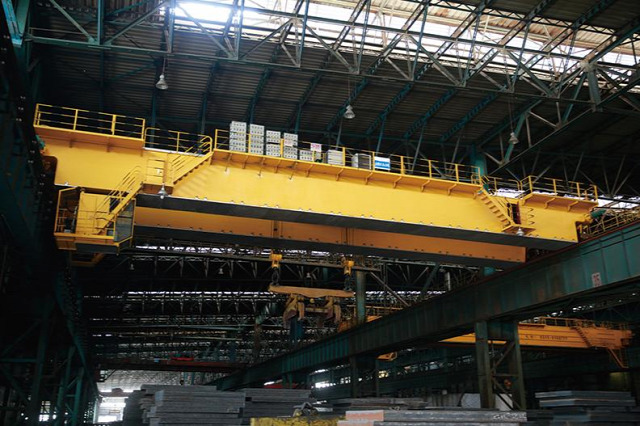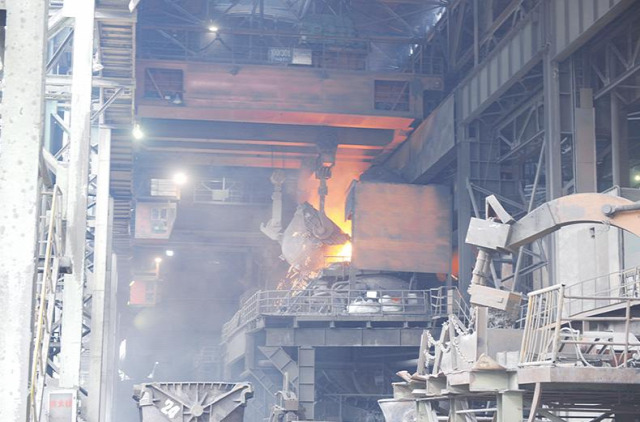Steel mills are critical to modern infrastructure and industrial development, producing materials used in construction, manufacturing, and energy sectors. To handle the high demands of steel production, facilities rely on robust machinery and equipment. Among these, 50-ton bridge cranes play a vital role in ensuring seamless operations, from material handling to production processes. This article explores the significance of 50-ton bridge cranes in steel mill operations, highlighting their applications, advantages, and impact on productivity.

Key Applications of 50-Ton Bridge Cranes in Steel Mills
Steel mills are highly demanding environments requiring precise and reliable equipment. A 50 ton bridge crane is uniquely suited for several critical applications, including:
-
Material Handling
- Steel mills involve the movement of heavy raw materials such as iron ore, coal, and scrap metal. Bridge cranes facilitate efficient loading and unloading of these materials from trucks or railcars to storage areas or processing lines.
-
Molten Metal Transportation
- In steelmaking, molten metal is transported from blast furnaces to casting areas. A 50-ton bridge crane equipped with heat-resistant components ensures safe handling of molten material, minimizing risks and maintaining operational continuity.
-
Slab and Billet Handling
- After molten metal is cast, it solidifies into slabs, billets, or blooms. These products often weigh several tons and require precise movement for further processing. Bridge cranes enable efficient transfer of these heavy loads to rolling mills or storage areas.
-
Coil and Sheet Transport
- Finished steel products like coils and sheets need to be moved for packaging, storage, or shipping. A 50-ton bridge crane provides the capacity and control required to handle these heavy yet delicate products without damage.
-
Maintenance Support
- Steel mills use a range of equipment such as blast furnaces, rolling mills, and conveyor systems. A 50-ton bridge crane is instrumental in lifting heavy components during maintenance or repairs, reducing downtime.

Advantages of Using 50-Ton Bridge Cranes
-
High Load Capacity
- With a load capacity of 50 tons, these cranes can handle heavy materials and equipment with ease, accommodating the rigorous demands of steel mill operations.
-
Precision and Control
- Advanced control systems in modern bridge cranes provide precision in load handling, ensuring safety and minimizing the risk of accidents during operations.
-
Durability
- Bridge cranes designed for steel mills are built with durable materials that can withstand extreme temperatures, dust, and vibrations, ensuring long-term reliability.
-
Space Efficiency
- Unlike other lifting equipment, bridge cranes are mounted overhead, saving valuable floor space in busy steel mill environments.
-
Customization
- Manufacturers offer customized solutions to meet specific operational needs, such as specialized hooks for coil handling or heat-resistant components for molten metal transport.
Impact on Steel Mill Productivity
-
Enhanced Operational Efficiency
- By automating the movement of heavy materials, 50-ton bridge cranes streamline workflows, reducing manual labor and improving throughput.
-
Increased Safety
- Steel mill environments pose several safety risks due to heavy loads, high temperatures, and complex machinery. Bridge cranes equipped with anti-sway systems, emergency stop features, and overload protection significantly enhance workplace safety.
-
Reduced Downtime
- Quick and efficient movement of materials ensures that production lines operate continuously, minimizing delays caused by material shortages or equipment malfunctions.
-
Cost Savings
- Efficient material handling reduces energy consumption and wear on other machinery, resulting in lower operating costs. Additionally, the long lifespan of a 50-ton bridge crane contributes to its cost-effectiveness.
Technological Innovations in 50-Ton Bridge Cranes
Recent advancements in crane technology have further enhanced their functionality in steel mills. Notable innovations include:
-
Automated Systems
- Automation allows bridge cranes to perform repetitive tasks with minimal human intervention, improving efficiency and reducing human error.
-
Remote Control Operations
- Operators can control cranes remotely, ensuring safety during hazardous operations such as handling molten metal.
-
Smart Sensors
- Modern cranes are equipped with sensors that monitor load weight, positioning, and environmental conditions, providing real-time data for improved decision-making.
-
Energy-Efficient Designs
- Energy-efficient motors and regenerative braking systems reduce power consumption, making operations more sustainable.
Case Study: A Steel Mill’s Experience with a 50-Ton Bridge Crane
A large steel mill in Asia installed a 50-ton bridge crane to handle molten metal and finished steel products. The crane was customized with heat-resistant components and an anti-sway system. Within the first year of operation, the mill reported a 25% increase in productivity and a significant reduction in workplace accidents.
Operators noted that the precision of the crane's movements minimized damage to delicate products like steel sheets, further improving the facility’s profitability. The mill also benefited from reduced maintenance costs, as the durable design of the crane required minimal repairs.
Selecting the Right 50-Ton Bridge Crane
When choosing a 50-ton bridge crane for a steel mill, several factors must be considered:
-
Load Requirements
- Ensure the crane can handle the maximum load capacity required for specific tasks.
-
Environmental Conditions
- Consider factors like temperature, dust, and humidity, which can affect crane performance.
-
Customization
- Opt for features tailored to specific needs, such as specialized attachments or advanced control systems.
-
Supplier Reputation
- Partner with a trusted supplier that offers high-quality cranes, professional installation services, and reliable after-sales support.
Conclusion
A 50-ton bridge crane is an indispensable tool in steel mill operations, facilitating the safe and efficient handling of heavy materials and equipment. Its versatility, durability, and advanced features significantly enhance productivity and safety in demanding industrial environments. As steel mills continue to evolve, investing in high-quality bridge cranes tailored to operational needs will remain crucial for maintaining competitiveness and meeting production goals.

